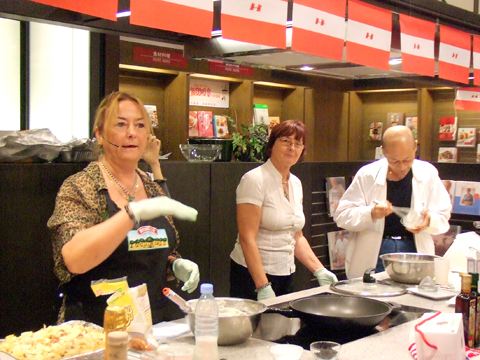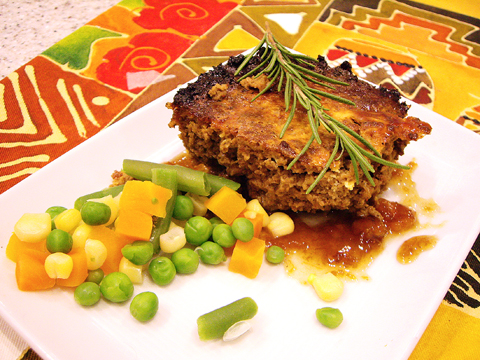Uproarious laughing, thunderous clapping, lip smacking and high-decibel “mmm” and “ahhh” noises are usually things that warrant the attention of the security guards in an upscale bookstore where quietness and tranquility are a must.
But on the third floor of Eslite’s flagship store in Taipei’s Xinyi District (信義), silence and strict adherence to the “no eating” rule is the very last thing on the store owner’s mind on the third Friday of each month.

PHOTO: JENNY W. HSU, TAIPEI TIMES
What started off last year with only a handful of participants has now exploded into the most popular activity offered at Eslite’s recipe section. It is estimated that more than 200 people show up for the class each month and the number keeps growing. At the class on Oct. 24, the seats were filled an hour before the demonstration, and by the time the class started there was barely any standing room left.
Strangers have become each other’s best food buddies because of the class, one woman said.
“I think the classes are fabulous. It is a wonderful opportunity to learn about other cultures and have a taste of different customs. You can tell a lot about one’s culture from the food they eat,” said Ann Keke, wife of the Nauru ambassador, who has attended the class six times to support her friends.

PHOTO: JENNY W. HSU, TAIPEI TIMES
The International Food Culture Exchange was founded by Taiwanese Pallas Chen (陳玉枝) in May last year when she realized that many people in Taiwan were missing out on the scrumptious cuisines of many countries around the world.
Using her connections and friendship with the various embassies and representative offices in Taipei, Chen said she has been able to convince many wives of ambassadors, representatives, deputy representatives and other volunteers from embassies and representative offices to put on a cooking demonstration featuring the popular dishes of their homelands.
Some of the flavors that have been concocted at the Eslite cooking studio include mafeh, a traditional vegetable soup of Gambia taught by Madame Juwara, the wife of the Gambian ambassador, aloo mutter, a popular Indian dish made with potato and green peas in tomato gravy demonstrated by Madame Seetharam, the wife of the head of the India-Taipei Association, and chicken maque choux, a much loved Cajun dish introduced by Keith Schneller, the director of the agricultural trade office at the American Institute in Taiwan (AIT).

PHOTO: JENNY W. HSU, TAIPEI TIMES
Despite the regional differences and the assortment of ingredients, all the dishes share one common trait — they are sprinkled with friendship and marinated in love.
“You see how I am blessed with such good friends?” Chen said with a smile, while looking over to rows of ladies and gentlemen from embassies and representative offices who were at the class to support Beata Pfeiffer, the wife of the Austrian Tourism Office deputy director giving a lesson on making kaiserschmarrn and fleckerl.
“I have made so many dear friends throughout the years and I am very grateful for the support they have shown me,” she said.
In her early 30s, Chen was invited by a friend to join the Taipei International Women’s Club, one the oldest charity organizations in Taiwan among the foreign community and founded in 1951 by Roberta Auburn, a wife of a USAID officer.
The purpose of the organization, she said, is to give services to marginalized populations through fundraisers, auctions, donations and other activities. After almost three decades in the club, Chen said, she gained an inside look on how to manage a charity foundation, how to pool positive energy together for a good cause, and most importantly, her experience has taught her that the strength of sisterhood transcends race, ethnicity and creed.
Through the years, Chen has witnessed embassies and representative offices in Taiwan shut down.
Many of her friends have come and gone. When Malawi unexpectedly cut ties with Taiwan last January after 42 years of friendship, Chen held no bitter feelings for the family of the Malawi ambassador and even rounded up carloads of clothes for Madame Edna Maloya to take back to her impoverished country.
At the cooking session on Oct. 24, Sieglinde Spanlang, the head of the Austrian Tourism Office, said her office was delighted to participate in the program because “there is a story behind every Austrian dish.”
Take kaiserschmarrn for example, she said, which literally translates to “emperor’s rubbish.” It gained its name when Empress Elisabeth, who was mindful of her waistline, demanded that the royal cook make food that would keep her slim.
However, his pancake-like creation met with her disgust, but won the approval of her husband Emperor Francis Joseph.
This month, the Spanish Chamber of Commerce will present Daniel Negreira, the chef of El Toro, to demonstrate how to make stuffed chicken with caramelized pine nuts and black squid risotto with parmesano reggianno.
Next month an American professor will make delicious fudge brownies using three types of chocolate and a French dessert, clauffuti.
For more information on the upcoming cooking demonstrations, see www.eslitebooks.com or call the cookbook section of the bookstore.
All classes are free and open to the public.

Taiwan is to commence mass production of the Tien Kung (天弓, “Sky Bow”) III, IV and V missiles by the second quarter of this year if the legislature approves the government’s NT$1.25 trillion (US$39.78 billion) special defense budget, an official said yesterday. Commenting on condition of anonymity, a defense official with knowledge of the matter said that the advanced systems are expected to provide crucial capabilities against ballistic and cruise missiles for the proposed “T-Dome,” an advanced, multi-layered air defense network. The Tien Kung III is an air defense missile with a maximum interception altitude of 35km. The Tien Kung IV and V

The disruption of 941 flights in and out of Taiwan due to China’s large-scale military exercises was no accident, but rather the result of a “quasi-blockade” used to simulate creating the air and sea routes needed for an amphibious landing, a military expert said. The disruptions occurred on Tuesday and lasted about 10 hours as China conducted live-fire drills in the Taiwan Strait. The Civil Aviation Administration (CAA) said the exercises affected 857 international flights and 84 domestic flights, affecting more than 100,000 travelers. Su Tzu-yun (蘇紫雲), a research fellow at the government-sponsored Institute for National Defense and Security Research, said the air

A strong continental cold air mass is to bring pollutants to Taiwan from tomorrow, the Ministry of Environment said today, as it issued an “orange” air quality alert for most of the country. All of Taiwan except for Hualien and Taitung counties is to be under an “orange” air quality alert tomorrow, indicating air quality that is unhealthy for sensitive groups. In China, areas from Shandong to Shanghai have been enveloped in haze since Saturday, the ministry said in a news release. Yesterday, hourly concentrations of PM2.5 in these areas ranged from 65 to 160 micrograms per cubic meter (mg/m³), and pollutants were

Taiwan’s armed forces have established response protocols for a wide range of sudden contingencies, including the “Wan Chun Plan” to protect the head of state, the Ministry of Defense (MND) said today. After US President Donald Trump on Saturday launched a series of airstrikes in Venezuela and kidnapped Venezuelan President Nicolas Maduro, concerns have been raised as to whether China would launch a similar “decapitation strike” on Taiwan. The armed forces regularly coordinate with relevant agencies and practice drills to ensure preparedness for a wide range of scenarios, Vice Minister of National Defense Hsu Szu-chien (徐斯儉) told reporters before a